Newsletter
Subscribe to Newsletter
Stay informed and always up to date with KATTOVIT. Be the first to hear about new products, discounts, advice texts, etc.
Schon ab 30€ ist deine Bestellung versandkostenfrei!
Mit deiner Anmeldung erklärst du dich mit unserer Datenschutzerklärung einverstanden.
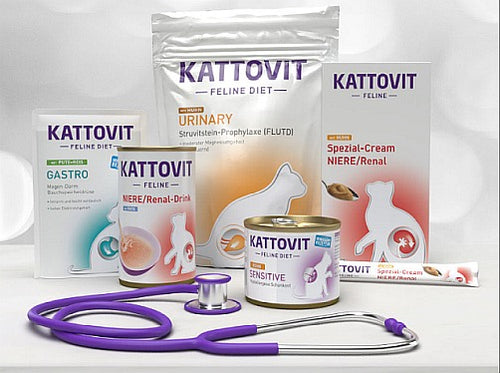
Mit deiner Anmeldung erklärst du dich mit unserer Datenschutzerklärung einverstanden.
Cart
Your cart is empty
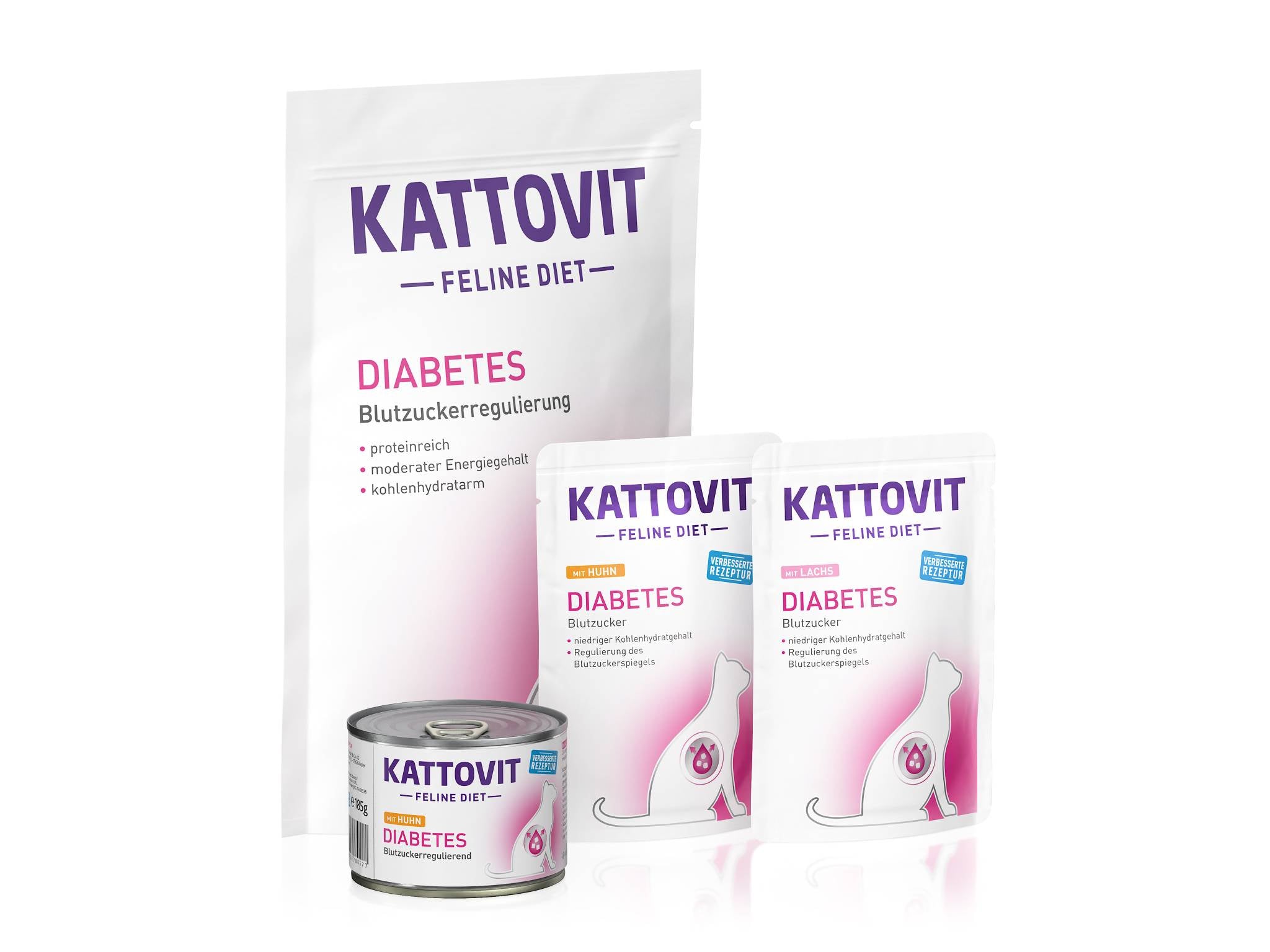

, inkl. MwSt. zzgl. Versand
- to support diabetes mellitus
- to reduce excess weight
- moderate calorie content, very filling
- M-formula
The sample package contains the following products - 1x each:
• Dry food diabetes/weight 400g
• Diabetes Chicken 185g can
• Diabetes Chicken 85g Pouch
• Diabetes Salmon 85g Pouch



Lieferzeit: 1 – 2 Werktage
The small sample package is perfect for getting to know the KATTOVIT diabetes products.
Diabetes is available in various flavors as dry food, wet food in freshness pouches and cans.
Dry food diabetes/weight 400g = Composition: meat and animal by-products, vegetable protein extracts, cereals, oils and fats, vegetable by-products (including pea fiber 1%, psyllium 0.1% and cellulose 1.6%), fish and fish products, minerals. Selected carbohydrate sources: rice 6%, corn 12%. Selected sources of short and medium chain fatty acids: poultry fat 12%, fish oil 2%. Other analytical components: starch 13.0%, total sugar 1.5%.
Diabetes Chicken 185g can = Composition: 40% chicken (stomach, liver, hearts, muscle meat, egg), rice (cooked), liver, lungs, stomach, cellulose, minerals, linseed oil. Carbohydrate source: 10% rice (cooked), source of short and medium chain fatty acids: 0.2% linseed oil. Other analytical components: starch 2.0%, total sugar 0.6%.
Diabetes Chicken 85g Pouch = Composition: Meat and animal by-products (including 24% chicken), vegetable by-products, oils and fats, minerals. Carbohydrate sources: potato starch 1%
Diabetes Salmon 85g Pouch = Composition: Meat and animal by-products, fish and fish by-products (4% salmon), vegetable by-products, oils and fats, minerals. Carbohydrate sources: potato starch 1%.
Dry food diabetes/weight 400g = 43.0% crude protein, 20.0% fat content, 3.0% crude fiber, 6.0% crude ash, 1.10% calcium, 0.90% phosphorus, 411 kcal / 100g
Diabetes Chicken 185g can = 9.0% crude protein, 3.0% fat content, 2.8% crude fiber, 1.8% crude ash, 80.0% moisture content, 0.20% calcium, 0.18% phosphorus, 72 kcal / 100g
Diabetes Chicken 85g pouch = 8.0% crude protein, 4.0% fat content, 2.0% crude fiber, 2.2% crude ash, 82.0% moisture content, 0.25% calcium, 0.20% phosphorus, 73 kcal / 100g
Diabetes Salmon 85g pouch = 8.0% crude protein, 4.0% fat content, 2.0% crude fiber, 2.2% crude ash, 82.0% moisture content, 0.25% calcium, 0.20% phosphorus, 73 kcal / 100g
Dry food diabetes/weight 400g = Nutritional additives / kg: Vitamin A: 16,000IU, Vitamin D3: 800IU, Vitamin E (all-rac-alpha-tocopheryl acetate): 240mg, Zinc (as amino acid zinc chelate, hydrate): 112mg, Iodine (as calcium iodate, anhydrous): 4mg, Selenium (selenium in organic form from Saccharomyces CNCM I-3060 (inactive selenium yeast)): 0.12mg, Taurine: 1,500mg, L-carnitine: 400mg. Technological additives: Antioxidants.
Diabetes Chicken 185g can = Nutritional additives / kg: Vitamin D3: 200I.U., Vitamin E: 20mg, Zinc (E6): 5mg, Iodine (3b201): 0.2mg, Manganese (3b503): 2mg, L-Carnitine: 100mg, Taurine 500mg
Diabetes Chicken 85g Pouch = Nutritional additives / kg: Vitamin A: 1,040IU, Vitamin D3: 125IU, Vitamin E (as all-rac-alpha-tocopheryl acetate): 20mg, Iron (as iron (II) sulfate, monohydrate): 40mg, Zinc (as zinc oxide): 28mg, Copper (as copper (II) sulfate, pentahydrate): 1.2mg, Manganese (as manganese (II) sulfate): 1mg, Iodine (as potassium iodide): 0.6mg, Taurine: 1000mg, L-carnitine: 50mg.
Diabetes Salmon 85g Pouch = Nutritional additives / kg: Vitamin A: 1,040IU, Vitamin D3: 125IU, Vitamin E (as all-rac-alpha-tocopheryl acetate): 20mg, Iron (as iron (II) sulfate, monohydrate): 40mg, Zinc (as zinc oxide): 28mg, Copper (as copper (II) sulfate, pentahydrate): 1.2mg, Manganese (as manganese (II) sulfate): 1mg, Iodine (as potassium iodide): 0.6mg, Taurine: 1000mg, L-carnitine: 50mg.
top bewertungen
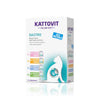
bestseller
Wet food | Multibox | Gastro | 12 x 85g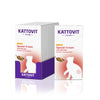
bestseller
Snack | Special Cream | Box | 11 x 6 x 15g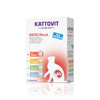
Diet food for cats
Wet food | Multibox | Kidney-Renal | 12 x 85g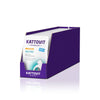
bestseller
Wet food | Chicken & Rice | Fresh pouch | 24 x 85g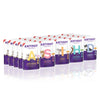
bestseller
Wellness Box | sample package | 25 x 85g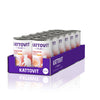
bestseller
Drink | Chicken | Can | 12 x 135ml
bestseller
Wet food | Chicken & Rice | Fresh pouch | 24 x 85gYour questions - our answers!
frequently asked Questions
In extreme cases, a vet may have to euthanize a cat in the final stages of untreated diabetes or it may fall into a sugar coma and die itself. However, diabetes does not have to take such a sad and agonizing course. With the help of a vet, the right medicine and diet, diabetic cats can lead an almost normal life and get their disease under control. If your cat shows the first signs of the disease, consult a vet immediately and ask for advice. Your cat's health can improve quickly with the right treatment.
If diabetes in cats is not treated, it can have serious consequences and can be life-threatening. The long-term elevated blood sugar levels gradually cause cells to die and lead to nerve and vascular damage. The increased urination also causes the cat to become increasingly dehydrated. Progressive hypoglycemia also causes the affected cat to become weaker and weaker, suffer muscle cramps and become disoriented. If left untreated, your cat will fall into a sugar coma in the final stage of the disease, which is acutely life-threatening and, in the worst case, can result in the cat's death. If treatment is delayed too long, it may therefore be necessary to euthanize the cat in the final stages of diabetes. Treatment of diabetes by a vet is vital and in most cases can enable a sick cat to live a happy and long life with only minor restrictions. Diabetes should therefore never be left untreated.
If your cat has diabetes, you should initially remain calm and not despair. With the right therapy and treatment, your cat can get better and live a long life. The first thing you should do is seek advice from your vet and find the right treatment for your cat together. By regularly measuring and recording your cat's blood glucose level, you will know exactly when and how much insulin you need to give him. Your vet will show you how to administer the insulin and measure the blood sugar. You should also change your furry friend's diet in consultation with your vet and choose special low-carbohydrate, high-protein food.
Diabetes can be recognized in a cat by symptoms such as increased drinking, frequent urination, ravenous appetite, tiredness, weakness and possibly weight loss. However, overweight cats also have a greater risk of developing diabetes. In addition, other signs such as walking on the hocks instead of the toes may occur as the disease progresses. If you suspect diabetes, you should not wait too long, but consult a vet immediately to clarify the symptoms. They will be able to determine what is wrong with your cat and prescribe suitable treatment.
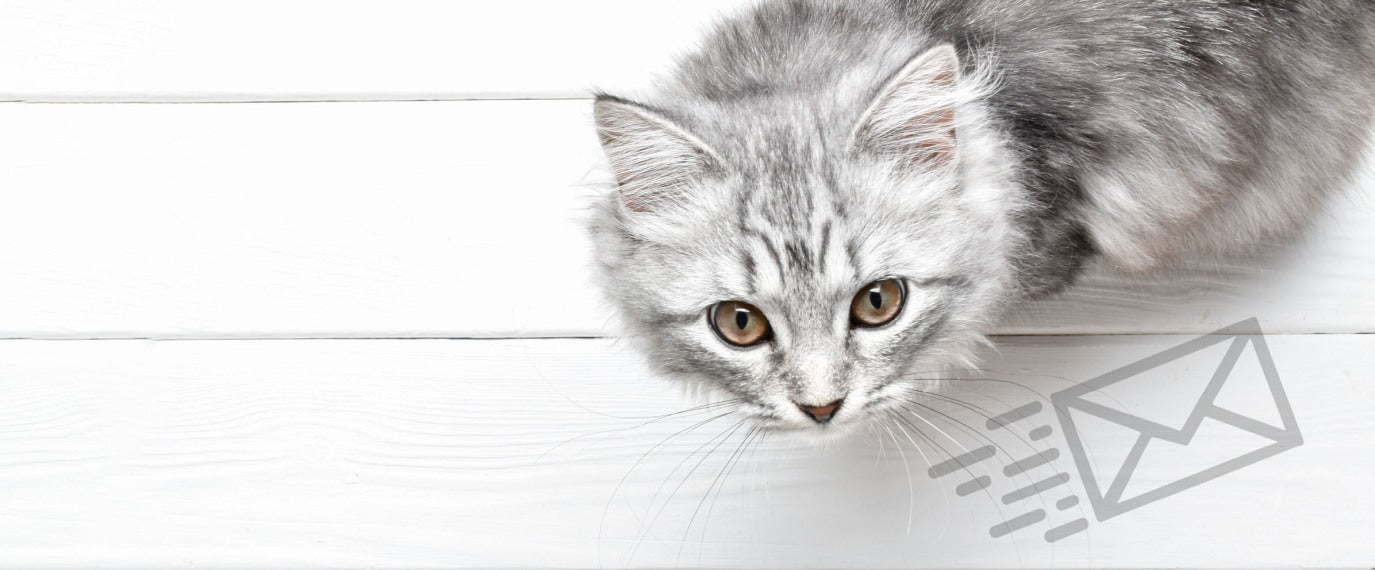
Newsletter
Subscribe to Newsletter
Stay informed and always up to date with KATTOVIT. Be the first to hear about new products, discounts, advice texts, etc.
Proven Quality
Tested quality based on the latest veterinary findings
Always fresh
Guaranteed freshness, directly from the manufacturer - for the best care for your pet.
40 years of experience
More than 40 years of experience and expertise in the production of high-quality animal feed.
Einfache & sichere Bezahlung